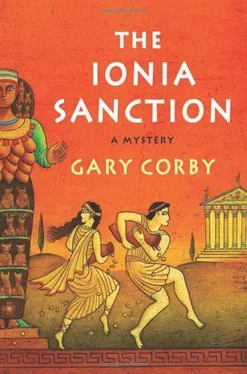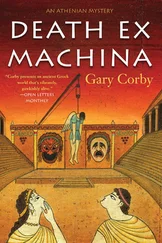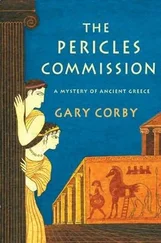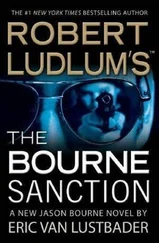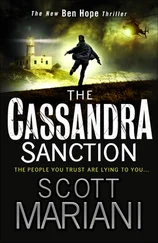Gary Corby - The Ionia Sanction
Здесь есть возможность читать онлайн «Gary Corby - The Ionia Sanction» весь текст электронной книги совершенно бесплатно (целиком полную версию без сокращений). В некоторых случаях можно слушать аудио, скачать через торрент в формате fb2 и присутствует краткое содержание. Год выпуска: 2011, ISBN: 2011, Издательство: Macmillan, Жанр: Исторический детектив, на английском языке. Описание произведения, (предисловие) а так же отзывы посетителей доступны на портале библиотеки ЛибКат.
- Название:The Ionia Sanction
- Автор:
- Издательство:Macmillan
- Жанр:
- Год:2011
- ISBN:9780312599010
- Рейтинг книги:4 / 5. Голосов: 1
-
Избранное:Добавить в избранное
- Отзывы:
-
Ваша оценка:
- 80
- 1
- 2
- 3
- 4
- 5
The Ionia Sanction: краткое содержание, описание и аннотация
Предлагаем к чтению аннотацию, описание, краткое содержание или предисловие (зависит от того, что написал сам автор книги «The Ionia Sanction»). Если вы не нашли необходимую информацию о книге — напишите в комментариях, мы постараемся отыскать её.
The Ionia Sanction — читать онлайн бесплатно полную книгу (весь текст) целиком
Ниже представлен текст книги, разбитый по страницам. Система сохранения места последней прочитанной страницы, позволяет с удобством читать онлайн бесплатно книгу «The Ionia Sanction», без необходимости каждый раз заново искать на чём Вы остановились. Поставьте закладку, и сможете в любой момент перейти на страницу, на которой закончили чтение.
Интервал:
Закладка:
Anaxagoras belched and declared, “Callias, my friend, that was the most delightful meal I have enjoyed in a long time. Thank you.” He turned to me and stage-whispered, “A philosopher should always praise his host. The Gods know where his next meal is coming from.”
Socrates stood as my attendant, behind my couch. Even without turning my head I could feel him taking all this in.
Slave boys carried a krater into the middle of the gathering. Callias, as host, would be the symposiarch, who would determine the ratio of water to wine to be poured in. A symposiarch controlled the nature of the evening with this single decision.
Callias ordered the boys, “I think we will begin with three to one.” Three parts water to one of wine meant a refined, cultured evening of discussion rather than a raucous party, but with enough wine to keep everyone glowing happy. The boys poured water and wine into the krater and stirred slowly before handing out cups. I took my first sip. The wine was excellent, heavily spiced with fenugreek.
“This is excellent, Callias, as good as anything we have at home,” Anaxagoras said as he swirled the wine in his cup.
“Anaxagoras comes to us from the other side of the Aegean Sea,” Callias said to me. “From the city of Clazomenae.”
Anaxagoras sighed. “Oh, for my own estates and my own wine. I miss them so.”
“Have you ever considered going home, Anaxagoras?” I asked. Perhaps if he went, Athens might lose its obsession with philosophy.
He looked at me in surprise and said, “Do you know why I moved to Athens?”
“I imagine because Athens is richer, and you were more likely to find a host here to act as your patron.”
He snorted. “It was to save my skin. The Persians wanted me dead after the Hellenes of Ionia rebelled thirty years ago. The Persians crushed the revolt and then went looking for the troublemakers who started it. One of them was me.”
“Every city rebelled?”
“Every city under Persian rule, which meant all the provinces on the Asian side of the Aegean Sea. All except Ephesus. The Ephesians decided to remain quiet and subservient. The reward for their cowardice was permission to govern themselves. They have the illusion of freedom as long as they do nothing to offend the Great King.”
“The Athenians supported the revolt,” said Callias. “But alas, it came to nothing. Many of our friends suffered.”
“I had a fine house, a farm for olives and another for sheep, an orchard, and a vineyard. It’s all gone. Fortunately I have my philosophy to sustain me.” Anaxagoras knocked back his wine and called for more.
The slave boys mixed more wine, and I took a moment to admire the krater. Like everything else in the house of Callias, it was a thing of beauty. The krater was painted with red figures and showed a battle scene, Hellenes fighting in phalanx against Persians.
Callias said, “I see you are admiring my krater, Nicolaos. It comes from the workshops of Ceramicus. I commissioned it years ago from Hieron the potter and had Makron paint the scenes to my direction. He was a touchy man, old Makron.”
Callias had named two of the greatest craftsmen of the past generation. This pot was worth more than most houses.
He was still speaking. “I couldn’t make a single suggestion without touching off his temperament. Why is it so many artists must be temperamental? Your own artistic father is a delight to deal with. All I wanted was a particular scene.”
“It’s very beautiful. But what is particular about the scene?”
“Look closely.”
I did. Something was odd about the Hellenes in the scene, but for a moment I couldn’t put my finger on it. Then I inspected the leading figure in the phalanx. He carried a spear and hoplon shield like all the others, but he wasn’t wearing armor. In fact, he was dressed in the robes of a priest.
I laughed. “Oh, Callias, this is the battle at Marathon, and the man leading the charge is you.”
Callias smiled. “So nice to be recognized.”
Callias had been one of the heroes who fought at Marathon, and some eccentricity of his had led him to fight not as a soldier, but as a priest. The krater spoke volumes about the subtle byways of his mind. Any man of the previous generation would immediately recognize Callias in the scene. The krater displayed his wealth and discrimination, but it also advertised that here was a man who served the state in every way, not only as diplomat and wealthy backer, but a man not afraid to put his own life on the line for Athens.
I had planned to say to Callias that Pericles’ anger with me over my failed attempt to capture Araxes was unfair, and suggest he might persuade Pericles against dismissing me when the mission was over. Now I put away that idea. No man who had stood in the line at Marathon would accept adversity, or bad luck, or a tough opponent, or overwhelming odds as an excuse for failure.
It occurred to me that every important leader in Athens had fought both at Marathon and the later sea battle at Salamis. The only exception was Pericles, who like me had been too young. If I wanted to be worthy to join them as a leader of Athens, I would have to fight my own Marathon.
My question about the krater had caused Pericles and Anaxagoras to fall into a discussion of pottery art. Anaxagoras said, “All those terribly practical men with their practical tools and practical wares in their practical houses.” Anaxagoras gave a mock shudder. “Practical men scare me. I shall stick to my philosophy.”
I said, “Philosophy isn’t practical?”
“You certainly can’t use it to make a pot. Now, if you wanted to know what the pot is made of…”
“The pot is made of clay,” I said, thinking the question quite obvious. If this is what philosophy was, then why did men make such a big thing of it?
“Ah now, but what is the clay made of?”
“Er … more clay?” I ventured.
“And if you take a pinch of the clay, what do you have? And what if you take a pinch of the pinch?”
“If I tear away a small pinch, then it’s still clay, so I guess if I tear away a small pinch from the small pinch it will be clay again.”
“And if you continue to take pinches from the pinches?”
“Obviously that will never work. My fingers are too large-”
“Bah,” Anaxagoras snorted. “You are thinking in practical terms. Forget the size of your fingers. Use your imagination, man. What if your fingers were no impediment?”
“Then I suppose it would still be clay no matter how small the pinch, but I must say this isn’t very pract-”
“Excellent. You begin to understand philosophy, young man. You have proven matter is infinitely divisible.”
“I have?” I said, perplexed.
“You have,” he said, with a firm voice. “Clay must consist of infinitesimally small particles of clay. You could continue taking pinches from the pinches for the rest of your life, and all you would get is an ever-decreasing amount of clay. So it is that water must consist of infinitesimally small particles of water. Air must consist of infinitesimally small particles of air.”
He reached for his wine cup and took a hefty swallow of infinitesimally small particles of wine. Callias had upped the ratio to two to one with the latest krater. I wondered if Anaxagoras had begun to feel the effect, or did he always talk like this? Anaxagoras rubbed his hands. “Now we get to the serious points,” he announced. “If all matter consists of infinitesimally small pieces, then how could all those clay particles have come together in a lump? Why aren’t all the different types of particle mixed together in an amorphous soup? How is it possible a clay pot consists of only clay particles?”
“Don’t ask me.”
Читать дальшеИнтервал:
Закладка:
Похожие книги на «The Ionia Sanction»
Представляем Вашему вниманию похожие книги на «The Ionia Sanction» списком для выбора. Мы отобрали схожую по названию и смыслу литературу в надежде предоставить читателям больше вариантов отыскать новые, интересные, ещё непрочитанные произведения.
Обсуждение, отзывы о книге «The Ionia Sanction» и просто собственные мнения читателей. Оставьте ваши комментарии, напишите, что Вы думаете о произведении, его смысле или главных героях. Укажите что конкретно понравилось, а что нет, и почему Вы так считаете.
